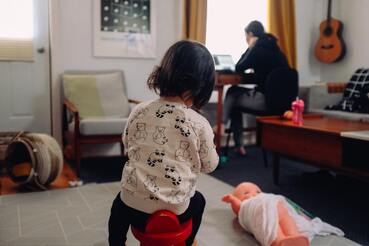 ‘What kind of mother feels grief and sadness after having a child? This is what, Helen, a therapy and coaching client of mine, said to me in our sessions a few months after becoming a mother. Helen was about to return to work after a few months on maternity leave. She was a successful training and development senior manager used to running a large team. She had dedicated herself to her career prior to motherhood. When she became a mother, things changed, but not how she had expected. As a successful career woman who had built her professional identity around competence, efficiency, organisation and intelligence, she had imagined being able to take motherhood in her stride. She was used to solving problems, finding solutions and, importantly, succeeding. For the most part, the concept of failing was foreign to her. Like many career-driven women raised with the post 1960s belief that they can be anything and do anything, she had expected that she would just be able to handle motherhood and slot it within the rest of her life. It became clear that she had very much expected it to be another project she could manage.
Helen had expected motherhood to be easy, natural and instinctive and, in particular, she'd expected it to be successful, by which she meant that she would know what to do and take it all in her stride, returning to work and picking off exactly where she left off. Helen’s expectations are not unusual. The usual answer to the question ‘what kind of mother feels grief and sadness after having a child’ is 'a bad mother'. Helen clearly was not that. The more accurate answer is 'a mother who does not understand and is not aware of the profound and all-encompassing transformation that a woman goes through when she becomes a mother'. When we become mothers, we expect to lose our pre-pregnancy figure. We hear a lot about how our bodies will change during pregnancy and after giving birth. We also hear a lot about how you whole world will change in a purely positive way because, it is implied, you will fall utterly and immediately in love with this new human being to whom you've just given birth, and nothing else will matter. You will know exactly what to do and how to be a mother, picking up right where you left off. All will be bliss, though tiring! What is less talked about is losing your pre-motherhood identity and sense of self and grieving your old life. At some point, usually soon after giving birth, the fact that you are now ‘mum/mom’ will really hit home. It might be a gift you receive with the word ‘Mum/Mom’ on it or the fact that ‘Mum/Mom’ seems to have become your first name, used equally and indiscriminately by the gynaecologist, the midwife or the shop assistant who, seeing you with a pram, asks ‘what would Mum like today’? The identities that you claimed prior to motherhood, whether senior executive, lawyer, veterinarian, café owner, dancer, academic, volunteer etc, will take second place to the priorities that come with motherhood. If your career has largely defined you pre-motherhood and was pretty much your whole world, it is quite possible that the sudden transition and sudden shift in priorities will shake your foundations and come as a shock. We hear a lot about the struggle to balance career and motherhood. This usually means balancing the additional demands on your time and energy that motherhood brings. As a society, we celebrate the supermum who appears to juggle her career and motherhood effectively and with ease. Yet, for some mothers, this can be a mask designed to hide the struggle with the identity shift that they are experiencing since they became mothers. The discussion around balancing career and motherhood rarely addresses the profound and unexpected ways in which our identify shifts when we become mothers. It rarely addresses the fact that you may not recognise yourself, may feel like you've lost a part of yourself. Helen was grieving her old life, her old self, the person she once was. She struggled with the reality that other parts of her life seemed to have shrivelled up: career, relationships, personal interests, personal time, freedom, independence. Her achievements and who she was seemed to count for little now. She was grieving her old self and her old life and felt confused, guilty and ashamed for feeling this way. “This is not how motherhood is supposed to be. What kind of mother grieves after having a baby?’, she said. Feeling guilty and at fault, she had not expressed those feelings to anyone. And therein lies the problem. The idealistic expectations of motherhood lead mothers to expect that motherhood will be easy, natural and instinctive and that their identity will not change, the underlying assumption being that, if a woman does not find it to be so, there is something wrong with her. The pretence of being completed happy, overjoyed and fulfilled by motherhood at all times and censoring how she truly felt was taking a toll on Helen’s relationships, her mental wellbeing, her health and her sense of self. It highlighted the stigma attached to feeling bad or ambivalent during motherhood. Where their pre-motherhood identity is rigid and unidimensional (e.g., career woman first and foremost) and with no preparation and little knowledge about how to be a mother, new mothers can find themselves struggling to shift their perception of themselves. This is not restricted to new mothers, though. It can last for years, if not acknowledged and unprocessed. For Helen, grieving her old life and feeling like she had lost part of herself was a sign of failure on her part. It led to her feeling ashamed, guilty, anxious, overwhelmed, inadequate and incompetent. This certainly is not how she wanted to go through motherhood and not how she wanted to feel upon returning to work. This could easily create the conditions for depression. Helen’s story is not unique. Feeling a sense of loss, grief and ambivalence is perfectly normal. We are conditioned to believe that motherhood is just another role that will come easily and naturally and will supersede anything else in our lives. Yet, the transition to motherhood is a multi-faceted long-term process that has physical, emotional, psychological, social, cultural, spiritual and economic ramifications. It is known as matrescence, a concept revived by Dr Aurelie Athan. This transitional process that can sometimes take years is rarely acknowledged or spoken about. Women feel huge pressure to suppress and censor any discordant feelings about motherhood. Silencing these feelings and refusing to acknowledge at a societal level that the transition to motherhood is a process that takes time (not just a quick pit stop after which you go back to normal), can be hard and can often leave mothers feeling ambivalent create huge barriers to women speaking up and working through this transition in a healthy way. Why is this important? Because according to the Australian Bureau of Statistics, mothers make up a large proportion of working people in Australia: in the 2021 census, 74.7% of couple families with children under 15 have mothers who are employed and 81.1% of single-parent families had an employed single mother. This means that motherhood and the workplace cannot be treated in isolation from each other. If left unrecognised, unacknowledged and unaddressed, a lack of awareness of women’s shifting identities and of the multi-faceted and profound transition that women experience when becoming mothers can lead to isolation, stress, anxiety, guilt, shame, anger, overwhelm, burnout and, possibly, depression. As reproductive psychiatrist Dr Alexandra Sacks explains, ‘matrescence is not a disease, but since it's not in the medical vocabulary, since doctors aren't educating people about it, it's being confused with a more serious condition called postpartum depression…. If women understood the natural progression of matrescence, if they knew that most people found it hard to live inside this push and pull, if they knew that under these circumstances, ambivalence was normal and nothing to be ashamed of, they would feel less alone, they would feel less stigmatized, and I think it would even reduce rates of postpartum depression.’ Lack of awareness, misunderstanding and unrealistic expectations of the transition process, not just for new mothers, has the potential to impact a woman's whole life, including her functioning in the workplace, leading to higher rates of absenteeism, reduced productivity and lower return to work rates, possible departure from work or forced career change. Healthy, motivated, engaged and thriving members of a society are fundamental to a functioning workplace and a functioning society, to raising well-adjusted children and to women being able to pursue careers they value. Ultimately, removing the stigma that mothers feel when they struggle with the transition to motherhood and normalising this struggle is beneficial not all, not just for mothers. It starts with normalising the reality for mothers and helping them realise they are not failing, they are not broken. If you are struggling with the transition to motherhood and feel like you are grieving your old self and your old life (even if you have returned to work) and want help, get in touch and book your free consult here.
0 Comments
Your comment will be posted after it is approved.
Leave a Reply. |
AuthorHi I'm Dr Fabienne and I believe in the capacity we all have to change our circumstances, given the right help, tools and inspiration! Archives
May 2024
Categories |

 RSS Feed
RSS Feed